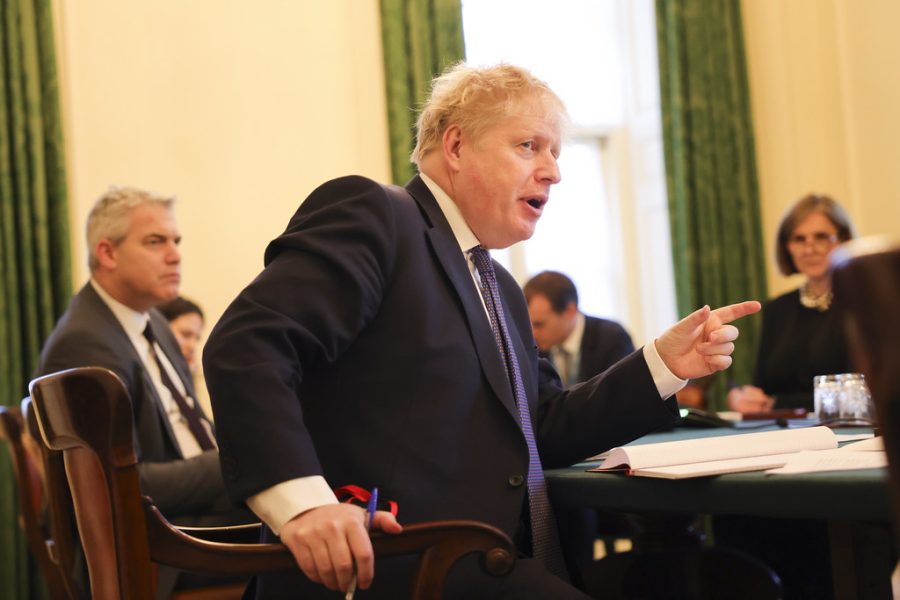Boris Johnson Caught In Heated ‘Partygate’ Scandal
The array of lockdown-breaching gatherings being called a “failure of leadership”
Prime Minister Boris Johnson holding the first British Cabinet meeting of 2022 on Jan. 5. Johnson is looking to move on from the recent controversy surrounding the Downing Street parties.
February 14, 2022
British Prime Minister Boris Johnson is being criticized as the subject of a contentious controversy. There has been an outcry from both the British public and government officials against a string of Downing Street parties that Johnson held in 2020 and 2021 while strong COVID-19 restrictions were in place.
All of the gatherings that are being investigated by British police took place in London’s 10 Downing Street, the prime minister’s official residence and executive office.
One such gathering, which occurred on Jun. 19, 2020, was for the prime minister’s birthday. According to a report by UK-based ITV News, up to 30 people congregated at the birthday party, during which the British government banned indoor gatherings of more than two people.
The first lockdown in the country was announced on Mar. 23, 2020, where the prime minister ordered citizens to “stay at home” and only allowed travel considered essential. The national quarantine was extended on Apr. 16 of that year for three more weeks, with the government establishing five tests that had to be fulfilled before restrictions were lessened. Lockdown measures ran well through June 2020.
Senior British Civil Servant Sue Gray recently constructed a report on the situation, dubbed “Partygate.” The report listed a total of 16 events that were questionable, but only 12 are actively being probed by police. Gray has called it a “failure of leadership” from Prime Minister Johnson, stating, “Against the backdrop of the pandemic, when the Government was asking citizens to accept far-reaching restrictions on their lives, some of the behavior surrounding these gatherings is difficult to justify.”
Prime Minister Johnson apologized in front of the House of Commons in response to the report’s findings on Monday, Jan. 31. He accepted the accounts as generally true and expressed his sympathies to those that had felt resentful because of his actions. Johnson maintained the notion that he and the government he runs is still trustworthy and will learn from their mistakes, citing their fulfilled promises of completing Brexit and controlling the COVID-19 pandemic as evidence of competent and responsible leadership.
“I get it and I will fix it,” declared Johnson. “I want to say to the people of this country that I know what the issue is. It’s whether this government can be trusted to deliver, and I say that we can be trusted.”
In light of the information being released, several members of Parliament have called for Johnson’s resignation (even constituents of his own party, the Conservatives). This includes Labour Party Leader Keir Starmer, former Cabinet Minister Andrew Mitchell and Chairman of the Defence Committee Tobias Ellwood.
Newcastle MP Aaron Bell boldly asked the prime minister if he was a fool for following social-distancing rules during his grandmother’s funeral in May 2020, saying that he was not even allowed to hug his own family as they grieved.
Former Prime Minister Theresa May challenged Johnson by questioning if he actually understood the rules that were in place or thought that they did not apply to Downing Street.
At least 54 MPs (members of Parliament) need to submit letters of no confidence in order to prompt a vote on leadership confidence, and a minimum of 180 Conservative MPs must vote in opposition to the prime minister so that a leadership contest will be conducted discussing his replacement.
Johnson has told the public and his critics to wait for the police to finish their investigation before jumping to conclusions regarding his leadership.
The “Partygate” scandal is just one of various incidents of world leaders and politicians flouting lockdown regulations in seemingly hypocritical manners, such as California Gov. Gavin Newsom’s dinner party in Nov. 2020, former New Zealand Health Minister David Clark’s beach visit in Mar. 2020 and Norwegian Prime Minister Erna Solberg’s birthday party in Feb. 2021. The series of events like these has warranted people’s increasing distrust in their respective governments and contributed to the disturbance of many political climates.
With the addition of the Russia-Ukraine crisis only appearing to grow more and more, Prime Minister Johnson will likely face building pressure in the near future.













